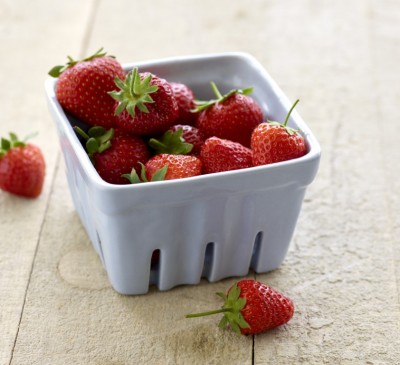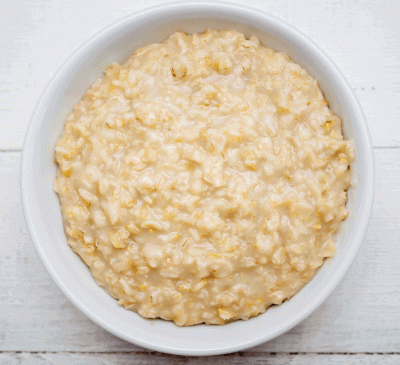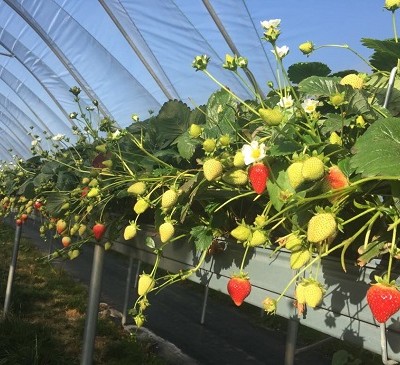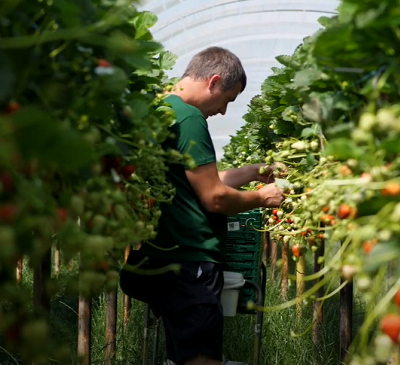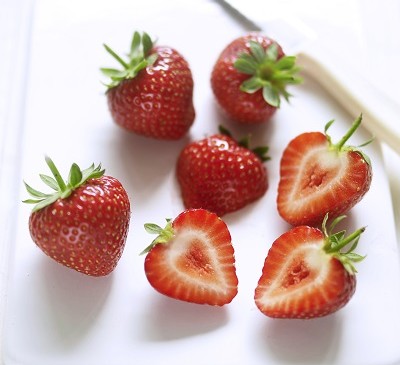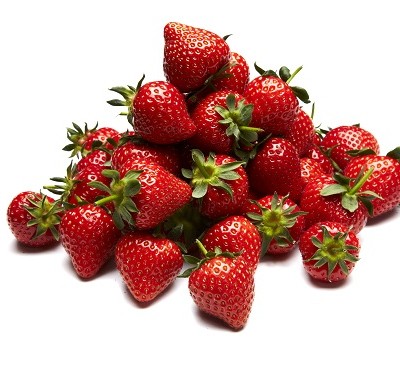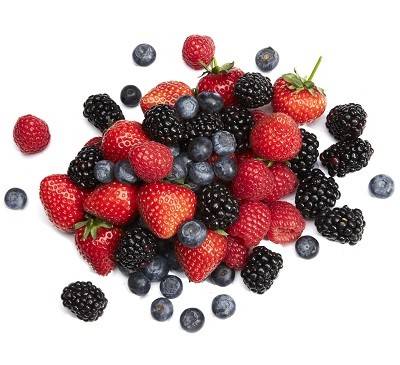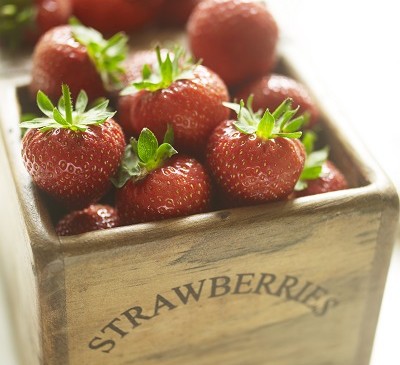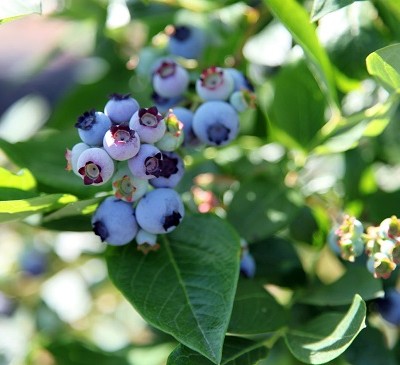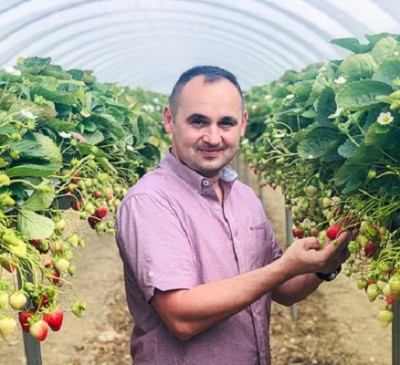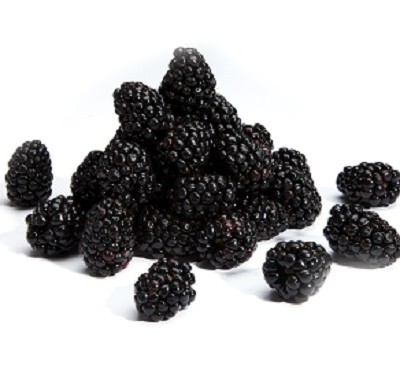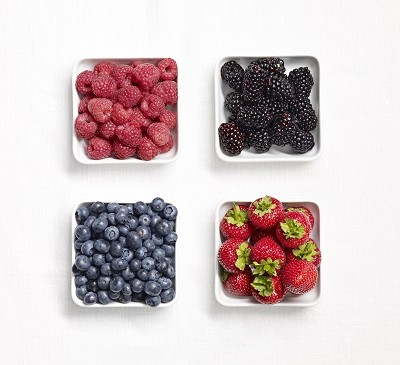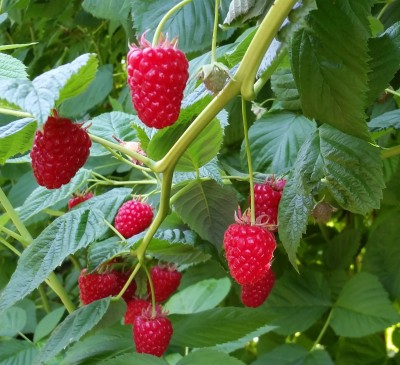
Latest News
Keep up to date with what is happening at Love Fresh Berries
If you would like more information, or comment from one of our members, please don’t hesitate to get in touch.
We’ve been working with our expert academy to talk all things berries - take a look here
6 reasons why you should eat strawberries and their tops
9th Feb 2021
It’s difficult to resist a perfectly ripe strawberry; in fact they’re one of the most popular berry fruits in the world. But did you know that it’s not just the sweet red part that’s good for us?
Atop each juicy strawberry is a leafy top called the calyx. Each year tonnes of strawberry tops are discarded and considered as food waste. But did you know that this humble leafy crown is also edible and may hold the key to unlocking some exciting health benefits?
Food waste is a serious problem. In fact, three major WRAP studies published in 2013 and 2016 estimated that 85% of the avoidable food waste arises in households and food manufacture.
In an effort to combat food waste in the home and make the most of our produce, Seasonal Berries has teamed up with top nutritionist, Lily Soutter to suggest how we can get the most of our strawberries.
Here are Lily’s recommendations on why and how to make the most out of your strawberries.
- Strawberries are a rich source of antioxidants
“Strawberries are a rich and diverse source of antioxidants. However what’s less well known is that strawberry calyx contains antioxidants too.
“One study which looked at the fruits and leaves of blackberries, strawberries, and raspberries concluded that the leaves had a high ORAC value. ORAC value is a measure of the antioxidant capacity of different foods. However it’s important to note that as leaves become older, the ORAC value decreases, so the leaves of fresh strawberries are likely to provide the highest antioxidant value.
“Regular consumption of antioxidant rich foods may protect the body from damage caused by harmful molecules called free radicals. Common sources of free radicals include pollution, sunlight, smoke and even prolonged exercise.”
2. Strawberries may support the immune system
“Not only is the whole strawberry rich in plant antioxidants, but the red fleshy part is also extremely rich in the antioxidant vitamin C.
“In fact, eating just 8 strawberries (80g) can provide as much as 115% of your daily vitamin C intake. Many associate oranges with vitamin C, but strawberries are actually a higher source per 100g.
“Vitamin C contributes to the normal function of the immune system and the reduction of tiredness and fatigue.”
3. Strawberries may help with blood sugar regulation
“Research suggests that eating strawberries alongside a carbohydrate-rich meal may help reduce spikes in blood sugar and insulin levels.
“Improving blood sugar control and insulin sensitivity can be helpful for preventing metabolic syndrome and type 2 diabetes.
“Whilst it’s not clear as to why strawberries may have this blood sugar balancing effect, some studies have suggested that it may be down to their rich content of polyphenols (antioxidants), which may influence carbohydrate digestion and absorption.”
4. Strawberries may have antimicrobial effects
“One study analysed the tops and leaves of two hundred strawberry plants, and found that their large and diverse range of polyphenols are defensive against harmful microbes, and may even have benefit to human health.
“While these results are certainly exciting, much more research into strawberry leaf polyphenols in relation to human health is required.”
5. Strawberries may improve heart health
“Numerous studies have found an association between strawberry consumption and improved cardiovascular health. It appears their high content of berry anthocyanins may play a role in reducing inflammation and oxidative stress, blood pressure and even improving our cholesterol profile.
“In contrast to the fleshy red fruit, the strawberry calyx has been largely overlooked when it comes to health benefits. While it’s too early to state if strawberry calyx can actually lower blood pressure, one promising study showed potential vasodilatory effects. The study used water extracts of the strawberry leaf and showed an improvement in blood flow within isolated animal aortic rings.”
6. Strawberries can help with weight management
“Strawberries can satisfy any sweet craving, yet are surprisingly low in sugar and calories. With just 6g of sugar and 33 calories per 100g, they can provide the sweet fix we desire whilst keeping our waistlines trim.
“And for an even more indulgent option, try dipping strawberries into antioxidant rich dark chocolate and coconut flakes.”
Lily’s tips on how to include strawberries and their tops in your diet and reduce wastage:
- Add both to smoothies
- Strawberry leaf tea. Using the stalks and leaves – leave to brew for a few minutes in boiling water
- Vinegar – soak the berries, including the tops, in vinegar (balsamic works especially well) for at least 48hrs, then add to salads.
- Add to juices
- Infused water - add sliced strawberries and their leaves to water and leave to infuse
- Add strawberry compote for puddings or breakfast topping
- Make strawberry leaf kombucha tea
Love Fresh Berries launches new Eat Well With Berries recipe book
14th Jan 2021
Download PDFYou can download our new book filled with delicious, healthy berry recipes by clicking on the PDF button.
Here at Love Fresh Berries, one of our great pleasures is sharing wonderful recipes with berry lovers.
Did you know that berries are one of the healthiest foods you can eat, and also incredibly versatile, meaning they work perfectly in breakfast, lunch, dinner and snacks.
Berries are tasty and loved by all ages, so why not try adding berries to your meals to get an added health boost, whatever time of day. We believe that healthy eating doesn’t have to be boring - take a look at our selection of recipes made with berries that will brighten up every-day meal times and help to support a healthy diet.
In this book are some of our favourite nutritious recipes. We hope you love them as much as we do. And if you try them, tell us about it.e....
Love Fresh Berries launches Winter Comforts Recipe Book
12th Nov 2020
Download PDFHere at Love Fresh Berries, one of our great pleasures is sharing wonderful recipes with berry lovers. Berries really are the most versatile fruit - perfect for savoury dishes, cocktails or a sweet treat.
We've created this book to showcase some of our favourite winter season berry recipes. We hope you love them as much as we do. And if you try them, tell us about it.
You can view the recipe book online by clicking here, or download it from this article.
FareShare porridge challenge
30th Oct 2020
T&Cs:
- To enter the challenge, users must tag @lovefreshberries in their post and use the hashtag #PorridgeArt
- By participating in this challenge and using #PorridgeArt we will donate 50p for each entry to FareShare up until a maximum of £1,000.00
- 1 meal = 25p metric, meaning a donation of £1,000 would provide 4,000 meals. FareShare calculates the number of meal equivalents that we redistribute in accordance with UK Government recommendations on the amount of meal equivalents that 1 tonne of mixed food redistribution equates to. This recommendation yields a total of 2,381 meal equivalents per tonne of redistributed surplus food. By using this calculation and dividing it by the annual running costs of FareShare UK, we are able to state that the cost per meal equivalent that FareShare redistributes is £0.25, or 25p. Put another way, for every 25p that is donated to FareShare, the equivalent of 1 meal is redistributed.
T&Cs:
- To enter the challenge, users must tag @lovefreshberries in their post and use the hashtag #PorridgeArt
- By participating in this challenge and using #PorridgeArt we will donate 50p for each entry to FareShare up until a maximum of £1,000.00
- 1 meal = 25p metric, meaning a donation of £1,000 would provide 4,000 meals. FareShare calculates the number of meal equivalents that we redistribute in accordance with UK Government recommendations on the amount of meal equivalents that 1 tonne of mixed food redistribution equates to. This recommendation yields a total of 2,381 meal equivalents per tonne of redistributed surplus food. By using this calculation and dividing it by the annual running costs of FareShare UK, we are able to state that the cost per meal equivalent that FareShare redistributes is £0.25, or 25p. Put another way, for every 25p that is donated to FareShare, the equivalent of 1 meal is redistributed.
British berry season 2020
7th Jul 2020
We know things have been tough this summer, so thank you for purchasing berries and continuing to support our British berry industry through these uncertain times. And to everyone working on berry farms, THANK YOU! We couldn't do it without you.
We hope that you continue to enjoy our strawberries, raspberries, blueberries and blackberries – available in supermarkets now.
Hall Hunter Partnership video
22nd Jun 2020
A big thanks to Hall Hunter Partnership for producing this video featuring pickers who have joined their farm since lockdown, to Pick for Britain and help face the challenges created by the Covid-19 pandemic. Enjoy!
How to make your fresh berries last longer this summer
13th May 2020
As we’re entering British berry season, it’s well known that berries can provide an array of vitamins, minerals and bioactive components such as anthocyanins, flavonoids, and carotenoids to benefit health and the immune system.[1] At this time of year berries are naturally sweet and deliciously fresh so perfect for eating straight out of the punnet. However, there are plenty of ways to make the most of berries in your weekly shop and reduce potential food waste. British Berry Growers, the berry experts, share these tips on enjoying berries all week long:
[1] https://www.sciencedirect.com/science/article/abs/pii/S0899900713002207?via%3Dihub
- Day 1-2 – Eat them fresh. Berries are naturally firm and sweet at this time. Add them to natural or frozen yogurt or eat them straight from the punnet as a tasty and convenient snack. We recommend washing fresh berries in cold water before eating them.
- Day 3 – Use them in smoothies. Three days after purchase berries may naturally begin to soften so adding them to a smoothie is a great way to benefit from the nutrients and delicious flavours. You can also add a sprinkle of chia or hemp seeds to your smoothie, if you have them in the cupboard. That will add some texture and increase your intake of the omega-3 fatty acid alpha-linolenic acid.
- … or jazz up ice cubes – Another useful way to use berries on day 3 is to add them into ice cubes. Simply add a raspberry, for example, into each square of an ice cube tray, top this up with water and freeze. Your berry ice cubes are perfect for using in G&Ts, Prosecco or Pimm’s this summer.
- … or simply freeze fresh berries just as they are. Freezing fresh berries just as they are and defrosting at a later day has been found to keep goodness ‘locked in’ and doesn’t negatively affect their antioxidant activity or anthocyanin levels.[1] Simply rinse and separate the fresh berries, lay them flat in a freezer bag or box, pop them in your freezer and they’ll be ready to use at a later date!
- Days 4 to 6 – Pureé or bake with berries. By day 4 berries tend to soften so pureéing them or baking with them is a great way to use them up and avoid waste. Berry pureés are delicious in yoghurts, porridge or mixed into muesli. Berries are also a great addition to so many recipes - try adding them to muffins or banana bread, not only a great, tasty way to use up berries but also a good way to help children develop their home cooking skills!
For more berry recipe inspiration head to lovefreshberries.com/recipes
ENDS
[1] https://pubmed.ncbi.nlm.nih.gov/15577185/
Celebrate summer at home with British strawberries
12th May 2020
British strawberry growers are excited to announce that the much-anticipated British strawberry season is now here! Warmer and sunnier April weather has meant that the season has started around a week earlier this year and strawberry lovers can now buy their favourite British fruit in supermarkets (in-store and online) around the country.
Many social events might be off the calendar this summer, but British strawberries can be enjoyed at home or in the garden as part of classic summer moments. From garden picnics or BBQs, to Wimbledon-inspired strawberries and cream from the comfort of your couch, British strawberries are here to remind everyone that despite recent challenges summer has arrived!
The start of season is also great news for Brits looking to boost their health and immunity. Gram for gram, strawberries contain more vitamin C than oranges.
Dr Emma Derbyshire, British Berry Growers’ public health nutritionist, explained: "Berries are a fantastic snack that offer numerous health benefits. Not only is the whole strawberry rich in antioxidants, but the red fleshy part is also abundant in vitamin C. In fact, eating just nine strawberries (108g) can provide all of your recommended daily vitamin C intake.”
Berries (strawberries, raspberries, blueberries and blackberries) have the biggest market share of all fruit grown in the UK, making up an impressive 22.8 percent, and this has pushed the value of the berry industry over £1.5 billion[i]. Fresh berries are the most popular fruit item in shoppers’ baskets with strawberries topping the list[ii].
During the past year, nearly 150,000 tonnes of strawberries were sold in the UK, that’s the equivalent to the weight of 1.67 million average men[iii]. Despite the very different supermarket shopping experience right now, berry growers are confident that British berry sales will remain strong this year.
Nick Marston, Chairman of British Berry Growers, the industry body that represents 95 percent of berries supplied to UK supermarkets said: “Like most industries facing challenges during this unprecedented time, our growers have had to overcome their own issues to ensure our loved British berries are available to the UK public. We are sure that consumers will continue to choose fresh British berries as part of their shop to enjoy and stay healthy. And in doing so, they’ll help to safeguard the future of our important British berry industry.”
-ENDS-
[i] Kantar data across 52 weeks, week ending 19 April 2020
[ii] Kantar data across 52 weeks, week ending 19 April 2020
[iii] Average man weights 197.6lbs. 1 tonne – 2,204.62lbs. 1 tonne equivalent 11.16 men. 11.16 x 150,000 = 1.67 million
Consuming your 5-a-day, including berries, could give mental wellbeing a boost
5th May 2020
While we’re all trying to stay positive at home, diet and healthy eating can play a huge part in mental wellbeing. New research suggests that getting your 5-a-day has beneficial effects on mental health.
While we’re all trying to stay positive at home, diet and healthy eating can play a huge part in mental wellbeing. New research suggests that getting your 5-a-day has beneficial effects on mental health.
We know that berries are mini powerhouses, providing an array of vitamins, minerals, flavonoids, tannins and phenolic and bioactive compounds[1]. Now recent research published in the Nutrients[2] journal has shown total intake of fruit and vegetables and some particular subgroups – including berries - can also have positive effects on mental wellbeing, including higher levels of optimism and reduced levels of psychological distress and depressive symptoms.
The research reviewed evidence from 61 studies looking at links between fruit and vegetable intake and mental health.
Dr Emma Derbyshire, Public Health Nutritionist and adviser to British Berry Growers commented: “These findings are really interesting and very applicable to modern life. We already know that berries are great for other aspects of our health, including cardiovascular wellbeing, cognition and bone health and this adds to the evidence even further.
“These important findings shows that we must not overlook berries when we think about striving for 5-a-day – a small daily handful of blueberries, raspberries, strawberries or blackberries are naturally sweet, tasty and now may help to give mental wellbeing a boost too!”
ENDS
NOTES TO EDITORS
About British Berry Growers
British Berry Growers is an organisation that represents 95 percent of berries supplied to UK supermarkets. It funds Love Fresh Berries – a year-round campaign that celebrates the seasonality of soft fruits.
[1] Baby B et al. (2017) Antioxidant and anticancer properties of berries. Crit Rev Food Sci Nutr 58(15):2491-2507.
[2] Głąbska D et al. (2020) Fruit and Vegetable Intake and Mental Health in Adults: A Systematic Review. Nutrients 12(1). pii: E115.
Berries and Immunity: What is the Evidence?
1st May 2020
With the rise in SARS-CoV-2 infections (COVID-19) now is a time when immunity matters more than ever before. There are many myths when it comes to which foods may help to reinforce the immune system but for berries there is some interesting, peer-reviewed research…
With the rise in SARS-CoV-2 infections (COVID-19) now is a time when immunity matters more than ever before. There are many myths when it comes to which foods may help to reinforce the immune system but for berries there is some interesting, peer-reviewed research…
An article published in Nutrition Reviews[1] considered the evidence looking at berries and their phytochemical profiles on the digestive and immune system. These systems were considered together as a large part of the immune system resides in ‘the gut’.
The authors concluded that whole berries were more likely to demonstrate effects on the immune system rather than separate compounds found in berries. The research showed that berry phytochemicals may work in synergy and be more effective at providing immune stimulation rather than separate exposures to single berry components.
From an evolutionary point of view, the human digestive system evolved on a diet abundant in raw fruits.1 As a result it is likely to contain the enzymes, microbiota composition, gut epithelium and other functions that coincide with the consumption of these fruits thus passing on the benefits to the immune system.1
Dr Emma Derbyshire, Public Health Nutritionist and adviser to British Berry Growers commented; -“Improving our health - be it through exercise or what we eat is more important than ever at the moment. Factors such as stress, illness and the natural ageing process can all influence and reduce our immunity.”
“Certain lifestyle modifications, however, could help to counteract some of these effects. This includes exercise, good quality sleep and having a healthy and balanced diet.[2] Including berries within our diets could be naturally pleasant way to improve nutrient and phytochemical density during these challenging times.”
ENDS
[1] Govers C et al. (2018) Review of the health effects of berries and their phytochemicals on the digestive and immune systems. Nutr Rev 76(1):29-46.
[2] https://www.nutrition.org.uk/healthyliving/helpingyoueatwell/covid19immunity.html
British blueberries hit shelves
9th Aug 2019
The British blueberry season is now in full swing, and with blueberries thriving due to an excellent growing season, now is the time to head to supermarkets to enjoy them at their very best.
The British blueberry season is now in full swing, and with blueberries thriving due to an excellent growing season, now is the time to head to supermarkets to enjoy them at their very best.
Often overshadowed by the start of British strawberry and raspberry seasons, many consumers aren’t aware that we have a British blueberry season. In the recent past, blueberries were a little known berry in the UK and the blueberries that were sold came from overseas. However as the popularity of the healthy and delicious berry grew rapidly, British berry growers started to plant blueberry bushes to meet the soaring demand with home grown fruit. As a result, British Berry Growers members’ production has grown from a tiny 281 tonnes in 2008 to 2,666 tonnes in 2018 – an increase of nearly 10 times with an even larger crop expected in the UK this year as more bushes reach maturity.
This year shoppers will see a whole range of varieties to enjoy including Liberty, Last Call, Draper, Aurora, Duke and Top Shelf.
Blueberries continue to grow in popularity. Since May last year, over £400m[i] worth of British blueberries were sold in the UK with shoppers spending 10.5 percent more on the health-boosting berry than in the previous year. In total, 41,000 tonnes of blueberries were sold in the 52 weeks (the equivalent weight of 6,500 elephants), an increase of 10 per cent compared to the 52 weeks up to 14th July 2018.
Berries, including blueberries, have the biggest market share of all fruit grown in the UK, making up an impressive 24.9 percent, and this has pushed the value of the berry industry over £1.4 billion[ii]. Fresh berries are now the most popular fruit item in shoppers’ baskets and their great health credentials are one big reason for their popularity.
Nutritionist Emma Derbyshire said: “Eating blueberries is one of the easiest ways to add nutrients to your diet and give your immune system a boost. Blueberries are packed full of fibre and antioxidants, including Vitamin C. They are perfect as a snack or to bake or cook with.
“There is also a growing body of evidence around how blueberries can contribute to cognitive function and also anti-ageing.”
Nick Marston, Chairman of British Berry Growers, the industry body that represents 95 percent of berries supplied to UK supermarkets said: “Blueberries are continuing their rapid growth in popularity and are loved by consumers of all ages. British Growers are developing and innovating more than ever to ensure we are producing the more and more of the best blueberries throughout the British season.”
-ENDS-
[i] Kantar data across 52 weeks, week ending 14th July 2019
[i][i] Kantar data across 52 weeks, week ending 14th July 2019
Our Ask the Grower series
6th Aug 2019
We have recently launched our new Ask the Grower series on Instagram, where we are asking consumers to put their questions about berries to our specialist berry growers around the country. Have a question you'd like an answer to? Email us at britishberrygrowers@redbrickroad.com
Thanks to Berries Farming Direct for the below blog post and grower Ilja Pavlov for being the first grower in our series, answering all your strawberry related questions.
At the end of July, right at the peak of the outdoor tunnel strawberry crop, our chief grower Ilja featured in Love Fresh Berries campaign #askagrower. Love Fresh Berries is the consumer campaign for British Berry Growers, which is our industry body for berries in the UK. This was the first time they have used social media to promote behind the scenes with member growers and Ilja was first to feature on their Instagram stories.
.jpg)
Following a visit to the farm and a tour of the tunnels, Ilja was busy answering all strawberry related questions for the #askthegrowerseries, where followers on Instagram and Twitter could send in their questions on all things berries.
You can see the answers to the questions over on Love Fresh Berries Instagram – checking out their Ask a Grower stories highlight and here’s a quick peak behind the scenes with Ilja and a few answers to questions that were sent in
Q. Can you grow strawberries by planting a shop bought strawberry?
A. No you can’t grow strawberries in this way, it’s impossible
Q. Do you grow your strawberries from seeds?
A. No you don’t grow from seeds but you grow from runners; these grow at the same time as strawberries and are good to create new plants with. We receive plants in an early state from propagators who prepare different varieties and we plant them out when it is the right conditions
Q. How do you decide what varieties are you are going to grow?
A. Every year we have trials based assessing quality, yield and taste and suitability to pick, ease of harvest etc and we then choose what new varieties to progress with
.jpg)
Q. What is the hardest thing about growing strawberries?
A. Environmental control can be difficult. Glasshouses have the best control as you can control ventilation, heating and CO2 – polytunnels is mostly just ventilation and protect from the rain
Q. What are polytunnels and why do you use them?
A. Polytunnels are different constructions that help to protect strawberries from different weather conditions
Here’s what Ilja had to say about the outdoor tunnel crop this summer:
"The tunnels crop is doing really well this year. We already get 600g per plant which means if we carry on as normal, we have big chance to get about 1200 g per plant - 20% above our budget
Both varieties (Favori and Murano) are very similar with yield but Favori as always have a longer gap between 2 flushes. All fruits have very good brix and minimum disease." Ilja Pavlov, Berries Direct
We just hope the hot weather we have experienced lately hasn't been too hot for our precious strawberry plants!
Want to get social? Follow Berries Direct Farming over on Facebook and Soloberry on Instagram
The Health Benefits of Eating Blackberries
5th Aug 2019
Blackberries contain a wide range of nutrients, including vitamins C and E, beta-carotene, potassium and magnesium as well as fibre and other plant nutrients that have numerous health benefits. These include flavonoids, which have powerful anti-inflammatory and immune system benefits. They also give blackberries their deep purple colour.
The Health Benefits of Eating Blackberries
By Nutritionist, Anita Bean
Blackberries contain a wide range of nutrients, including vitamins C and E, beta-carotene, potassium and magnesium as well as fibre and other plant nutrients that have numerous health benefits. These include flavonoids[1], which have powerful anti-inflammatory[2] and immune system benefits. They also give blackberries their deep purple colour.
· “Blackberries are a rich source of vitamin C”
A 100g portion provides 15 mg, which is 35% of your daily requirement. Vitamin C is an important antioxidant, which protects cells from damage, and strengthens the immune system. It maintains healthy skin and plays a role in the production of collagen, which keeps the skin smooth and elastic.
· “Blackberries may help reduce hunger”
Swapping your usual snack for blackberries may help you eat less at your next meal. A study at Loughborough University[3] found that people who ate a handful of mixed berries (including blackberries) instead of a sugary-snack (with the same calorie content) mid-afternoon ate 134 fewer calories at dinner in the evening.
· “They may help fight off colds”
Eating foods rich in flavonoids can significantly reduce your chances of catching colds and coughs. A study from the University of Auckland, New Zealand[4] found that people were 33% more protected from colds and upper respiratory tract infections if they regularly ate foods containing flavanoids compared with those who didn’t. Because flavonoids have anti-viral, anti-inflammatory, and antioxidant properties, they can boost your immune system and make you less likely to catch a cold.
· “They are a perfect post-workout snack”
Flavonoids play an important role in performance and recovery and studies[5] suggest that these compounds help reduce muscle soreness, muscle damage and inflammation after intense exercise, as well as speed up muscle recovery
· “They may help reduce inflammation”
Blackberries contain powerful anti-inflammatory compounds[6], which suggests that they may provide protection against inflammatory conditions[7]. A growing body of scientific research indicates that inflammation contributes to diseases such as heart disease, arthritis, and obesity.
· “They may help keep your brain young”
A study in the Journal of Agriculture and Food Chemistry[8] found that blackberry extract may provide a protective effect on brain, improve memory, learning and general brain function, as well as slowing the decline in age-related memory loss thanks to their high concentration of flavanoids.
· “Blackberries may help prevent weight gain”
The high flavonoid content of blackberries may help prevent weight gain by blocking fat absorption and boosting helpful flab-fighting gut bacteria. A study[9] conducted in 2734 UK female twins linked a flavonoid-rich diet to lower body fat. Those whose diets contained the most flavonoids had significantly less total body fat and abdominal fat compared with those who consumed the least.
· “Blackberries may help keep your heart healthy”
The high flavonoid content of blackberries may contribute to their role in protecting against heart disease. Scientific studies[10] have linked diets high in flavonoids with a lower risk of heart disease, stroke and hypertension. Flavonoids are thought to lower the risk of atherosclerosis through protecting LDL cholesterol from free radical damage and strengthening blood vessel walls[11].
The humble blackberry has a number of benefits. Eating around 10 blackberries will count towards one of your five-a-day. These berries are readily available in abundance and tasty straight from the punnet.
[1] https://www.ncbi.nlm.nih.gov/pubmed/23697506
[2] https://www.ncbi.nlm.nih.gov/pubmed/23697506
[3] http://www.seasonalberries.co.uk/snack-smart
[5] https://www.ncbi.nlm.nih.gov/pmc/articles/PMC3742027/
[6] https://www.ncbi.nlm.nih.gov/pubmed/22082199
[7] https://www.ncbi.nlm.nih.gov/pubmed/23697506
[8] https://www.ncbi.nlm.nih.gov/pubmed/22082199
[9] https://www.ncbi.nlm.nih.gov/pubmed/28100511
[10] https://www.ncbi.nlm.nih.gov/pubmed/12198000
[11] https://www.ncbi.nlm.nih.gov/pubmed/12818719/
Nutrition myths revealed
16th Jun 2019
Eating too much fruit rots your teeth, oranges are the best source of Vitamin C and avoiding fruit in the evening are food ‘facts’ we get totally wrong.
Eating too much fruit rots your teeth, oranges are the best source of Vitamin C and avoiding fruit in the evening are food ‘facts’ we get totally wrong.
A study of 2,000 adults, carried out by Love Fresh Berries, revealed the main food myths which consumers believe.
A third of people believe organic fruit is healthiest and a fifth think that juicing fruit detoxes their body.
Nicholas Marston, chairman of Love Fresh Berries, said: “There are so many food myths and misinformation around that it’s sometimes hard to know what is actually good for you and what we should be eating.
“Often the difference between truth and a myth can be somewhat unclear so it’s important to distinguish between them and get information from reputable sources, not hearsay.”
Almost half of those surveyed admitted that they believed something about food which they later found to be untrue, although 50 per cent say they are knowledgeable about food.
Two thirds of people agree that it is hard to know which food facts to believe as there are different pieces of advice flying around every day, with a fifth of those strongly agreeing.
But almost half of Brits don’t bother sourcing nutritional information. The majority that do use websites to do so, or seek nutrition knowledge from TV over speaking to a medical professional or nutritionist. Another quarter will decide whether something is good or bad to eat after looking through social media.
Nicholas Marston added: “There’s so much information online, it’s often hard to tell what’s true and what isn’t.
“With the growth of social media we have seen a huge rise in unqualified influencers giving nutritional advice to followers, even telling them not to eat fruit or berries because of high sugar content, or because they’ll rot your teeth when in fact, berries are nutritional powerhouses which have many health benefits.”
Dr Emma Derbyshire: “We are in the information era yet it seems that ‘over’ information could be confusing the lay public. We must remember to utilise information that is evidence-based rather than trusting ‘popular’ followers.
“With social media, people’s views on food are now openly public. When it comes to fruit there are many myths but we should not let these impact what we eat. The benefits of fresh fruits far outweigh any mythological drawbacks.”
ENDS
British raspberry season arrives early
10th Jun 2019
Raspberry lovers can enjoy an early start to the British raspberry season this year with the berries already on the supermarket shelves in abundance.
Growers estimate that this season is starting three weeks earlier than usual and they put that down to the good spring weather. Mid-June sees the raspberry season already in full swing with high quality British raspberries widely available. Strong raspberry plants, prompted by the spring sunshine, are ensuring good flavour and bigger, bolder raspberries.
Not only will the fruit be of high quality, growers expect the British season to last right through to early November. This is as a result of careful planting to ensure a continuous supply of the berry over the upcoming summer months. The leading raspberry varieties grown in the UK have the ability to flower and fruit over a long period of up to five months, whilst traditional types typically produced fruit for just a four to six week period.
This year shoppers will see a whole range of varieties to enjoy including Berry Gem, Berry Jewell, Driscolls® Maravilla™, Vajolet and Lagorai.
Since May last year, almost £320m[i] worth of raspberries were sold in the UK with shoppers spending 16 percent more on the classically British berry than in the previous year. In the last four weeks alone, the volume of raspberries available in stores has grown by 20 percent[1].
Berries, including raspberries, have the biggest market share of all fruit grown in the UK, making up an impressive 22.9 percent, and this has pushed the value of the berry industry over £1.4 billion[ii]. Fresh berries are now the most popular fruit item in shoppers’ baskets and their great health credentials are one big reason for their popularity.
Nutritionist Emma Derbyshire said: “Raspberries are a powerful source of nutrients including vitamin C, manganese, dietary fibre and polyphenols which are thought to have potent antioxidant properties.
“There is a growing body of evidence[1] that raspberries could have a valuable role to play in helping to maintain wellbeing, as part of a heart healthy diet. Their mechanisms are in need of further study but it is thought that their consumption may help to regulate and maintain healthy metabolic activities in our body’s cells".
Nick Marston, Chairman of British Berry Growers, the industry body that represents 95 percent of berries supplied to UK supermarkets said: “We are always striving to deliver the highest quality fruit to our customers. Ongoing innovations in the industry allow us to prioritise sweetness and flavour which has helped berries become the most popular fruit in shopper’s baskets.”
[1] Kantar data to 19th May 2019
[i] Kantar data across 52 weeks, week ending 19th May 2019
